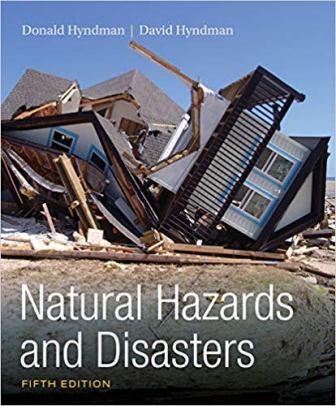Description
Test Bank For Natural Hazards and Disasters 5th Edition By Hyndman
Chapter 02 – Plate Tectonics and Physical Hazards
1. Earth’s crust is thinner than its mantle.
a. True
b. False
ANSWER: True
REFERENCES: Earth Structure
KEYWORDS: Bloom’s: Remember
2. The concept of isostacy states that high-density rock will stand higher than low-density rock, which explains the formation of subduction zones.
a. True
b. False
ANSWER: False
REFERENCES: Earth Structure
KEYWORDS: Bloom’s: Remember
3. The plates involved in plate tectonics are part of Earth’s lithosphere.
a. True
b. False
ANSWER: True
REFERENCES: Plate Movement
KEYWORDS: Bloom’s: Remember
4. A divergent boundary is responsible for rift zones.
a. True
b. False
ANSWER: True
REFERENCES: Hazards and Plate Boundaries
KEYWORDS: Bloom’s: Remember
5. Convergent boundaries produce a relatively low number of earthquakes compared to other boundaries.
a. True
b. False
ANSWER: False
REFERENCES: Hazards and Plate Boundaries
KEYWORDS: Bloom’s: Remember
6. The tallest mountain ranges are created at transform boundaries.
a. True
b. False
ANSWER: False
REFERENCES: Hazards and Plate Boundaries
KEYWORDS: Bloom’s: Remember
7. Transform boundaries are responsible for the formation of island chains such as the Hawaiian Islands.
a. True
b. False
ANSWER: False
REFERENCES: Hazards and Plate Boundaries
KEYWORDS: Bloom’s: Remember
8. Volcanoes are only formed at plate boundaries, and cannot exist in the middle of large plates.
a. True
b. False
ANSWER: False
REFERENCES: Hazards and Plate Boundaries
KEYWORDS: Bloom’s: Remember
9. The theory of continental drift was developed using the theory of plate tectonics.
a. True
b. False
ANSWER: False
REFERENCES: Development of a Theory
KEYWORDS: Bloom’s: Remember
10. Earth’s magnetic field played a crucial role in understanding subduction zones
a. True
b. False
ANSWER: False
REFERENCES: Development of a Theory
KEYWORDS: Bloom’s: Remember
11. Which statement about the Earth’s is true?
a. The lithosphere is less dense than the asthenosphere, and located above it.
b. The lithosphere is denser than the asthenosphere, and located above it.
c. The lithosphere is less dense than the asthenosphere, and located below it.
d. The lithosphere is denser than the asthenosphere, and located below it.
e. The lithosphere and asthenosphere are equally dense.
ANSWER: a
REFERENCES: Earth Structure
KEYWORDS: Bloom’s: Understand
12. Compared to the lithosphere, the asthenosphere is ____.
a. cooler and more rigid
b. cooler and more plastic
c. hotter and more rigid
d. the same temperature and rigidity
e. hotter and more plastic
ANSWER: e
REFERENCES: Earth Structure
KEYWORDS: Bloom’s: Understand
13. The concept of isostacy explains why ____.
a. magnetic differences exist in stripes along the seafloor
b. magma plumes are created
c. continental crust stands higher than oceanic crust
d. convection moves magma under the lithosphere
e. lithospheric plates move in response to convection
ANSWER: c
REFERENCES: Earth Structure
KEYWORDS: Bloom’s: Understand
14. Oceanic crust is denser than continental crust because ____.
a. continental crust stands at a higher altitude
b. oceanic crust is rich in silica
c. oceanic crust is compressed at convergent boundaries
d. water pressure from the oceans makes oceanic crust thinner
e. oceanic crust is rich in iron- and magnesium-containing minerals
ANSWER: e
REFERENCES: Earth Structure
KEYWORDS: Bloom’s: Understand
15. When oceanic plates meet continental plates at a convergent boundary, a ____.
a. subduction zone will form because the oceanic plate is more dense than the continental plate
b. subduction zone will form because the oceanic plate is less dense than the continental plate
c. rift zone will form because the oceanic plate is more dense than the continental plate
d. rift zone will form because the oceanic plate is less dense than the continental plate
e. subduction zone will form on the oceanic plate, and a rift zone will form on the continental plate
ANSWER: a
REFERENCES: Plate Movement
KEYWORDS: Bloom’s: Understand
16. Earth’s crust is divided into ____.
a. dozens of large plates and a much smaller number of small plates
b. about a dozen large plates and about an equal number of small plates
c. a small number of large plates and dozens of small plates
d. five large oceanic plates and an equal number of small plates
e. dozens of small plates
ANSWER: b
REFERENCES: Plate Movement
KEYWORDS: Bloom’s: Understand
17. Areas of Earth’s sea floor can create new crust because ____.
a. continental collisions raise mountains continuously higher
b. earthquakes consume new sea floor at transform zones
c. hot spots cause crustal material to sink into the mantle
d. continental plates rise higher through isostacy
e. crust is consumed in subduction zones
ANSWER: a
REFERENCES: Plate Movement
KEYWORDS: Bloom’s: Understand





Be the first to review “Test Bank For Natural Hazards and Disasters 5th Edition By Hyndman”